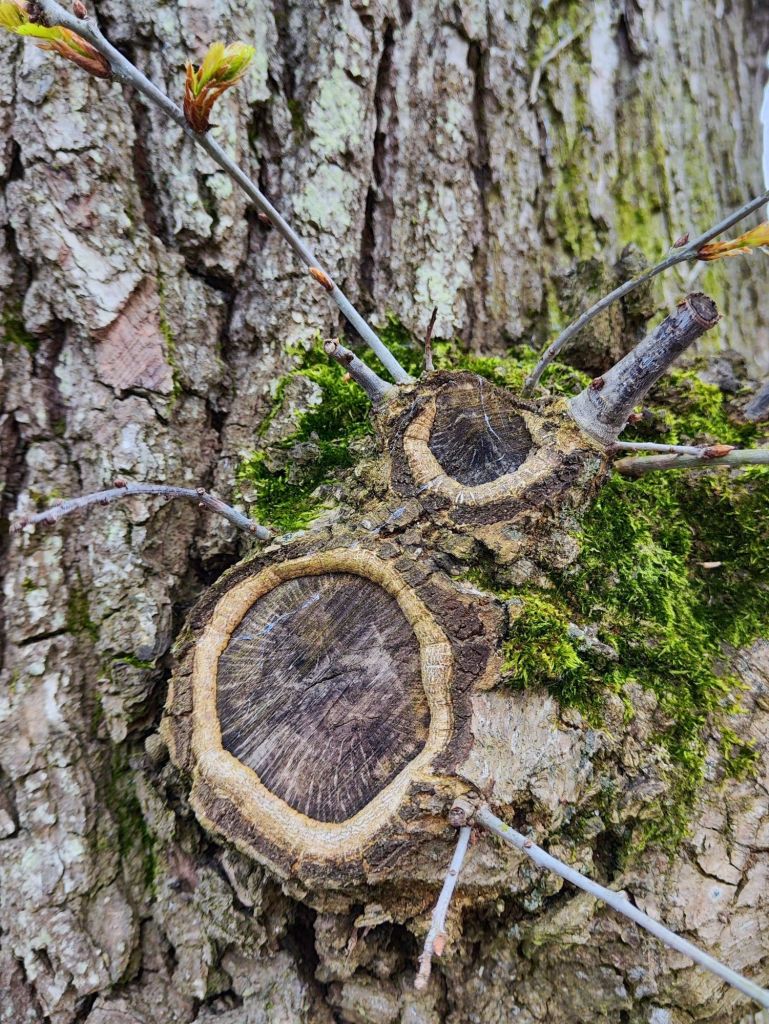
Does #AltTxt transfer?


education for more just societies: the roles of imagination, innovation and collaboration was the theme for the 2024 conference of the Education Studies Assocciation of Ireland, in Maynooth University late last week. The website says “The Educational Studies Association of Ireland is a voluntary, non-political body, dedicated to the advancement of educational research in Ireland”. This stated objective works on an individual level as well – I have been attending almost each year during my PhD studies, going to present my work in progress and leaving with encouraging ideas to move me on. This year I went to present some of the finished work, but more importantly, to say thank you. Beidh mé buíoch i gcónaí de mhuintir ESAI.
This was a huge conference – the programme was very intense, but the venue make it easy to move fom one parellel session to another fairly gracefully – helpful when the papers you wanted to hear within an hour were in different rooms (the My Agenda tab of the Conference4me app was invaluable here). The theme of social justice was strong right thru the three days, and there definitely was imagination, innovation, and collaboration in the research presented. As I had only learned of the death of Harrison Owen of Open Space a few days before the conference, and he was on my mind, I felt a keen sense what he calles the two drivers – passion & responsibility – in every single presentation, and the discussions that ensued.
‘without passion, nobody cares; without taking responsibility, nothing get done‘ (Harrison Owen)
Conference programs don’t always translate well from the printed schedule into real life, but this one did so in spades. A glance along the eX-Twitter timeline of #esai24 will give a flavour of the dynamic atmosphere over the three days. Being together over these three days, days with very generous breaks built in for refreshment and recovery from the intensity of the in-room sessions, afforded time for proper catching up with many friends made during the PhD study, and many friends from others parts of education life in Ireland.
Big shout out to president Celine Healy and her team for crafting a conference that was thoughtful in every possible sense of the word. And best wishes to incoming president Máirín Glenn for #easi25 😉








Selected Teachmeet data 2013-2019 by Mags Amond is licensed under a Creative Commons Attribution-NonCommercial-ShareAlike 4.0 International License.
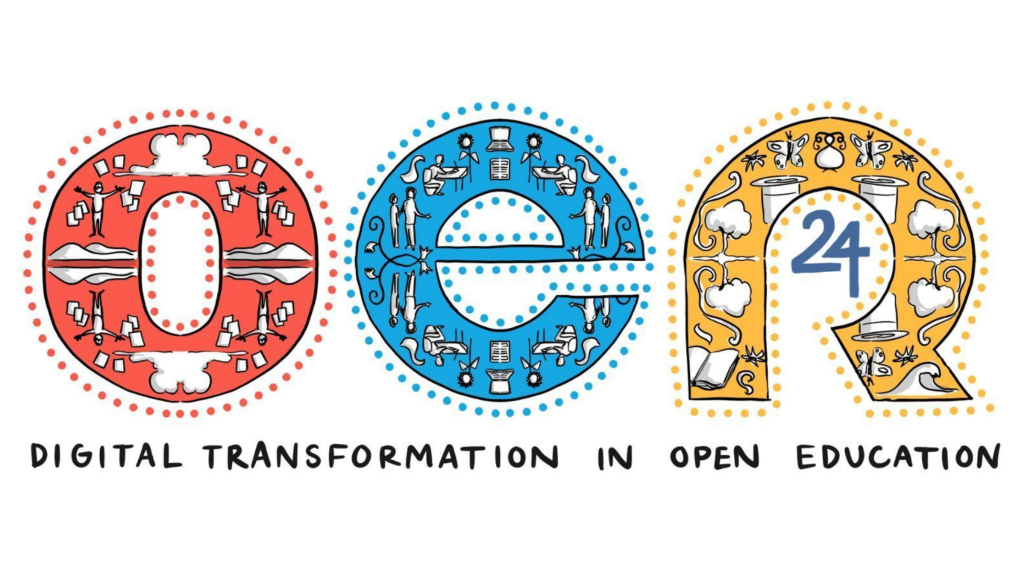
This was my second time to attend the OER conference. The venue being Cork meant a train journey for me so off to a great start. And having got to my hotel, Isaac’s, and discovered that Frances Bell was staying there too and we could share the commute out to MTU (and learned the secret way of the 207 bus thanks to Anne-Marie Scott), well that was another win, as we had much catching up to do.
Others have posted their responses to the two keynotes, two Gastas, and the many parellel sessions and workshops – this really was a learning event for me, huge thanks to the OER community for being such good teachers. I’m collecting links to these posts as I find them – looking back at a conference thru mulitple eyes is always of interest to me. Both keynotes were meticulously crafted and delivered with care and and an obvious deep love of and hope for both the domain and the community. All the Gastas were prepared for battle with equal attention to being perfomative informative provocative evocative … and striving to beat the Gasta Master’s guillotine countdown. (It’s cool to think that soon the global OE community will be fluent at counting in Irish). All the recorded plenaries are stored at the ALT website:
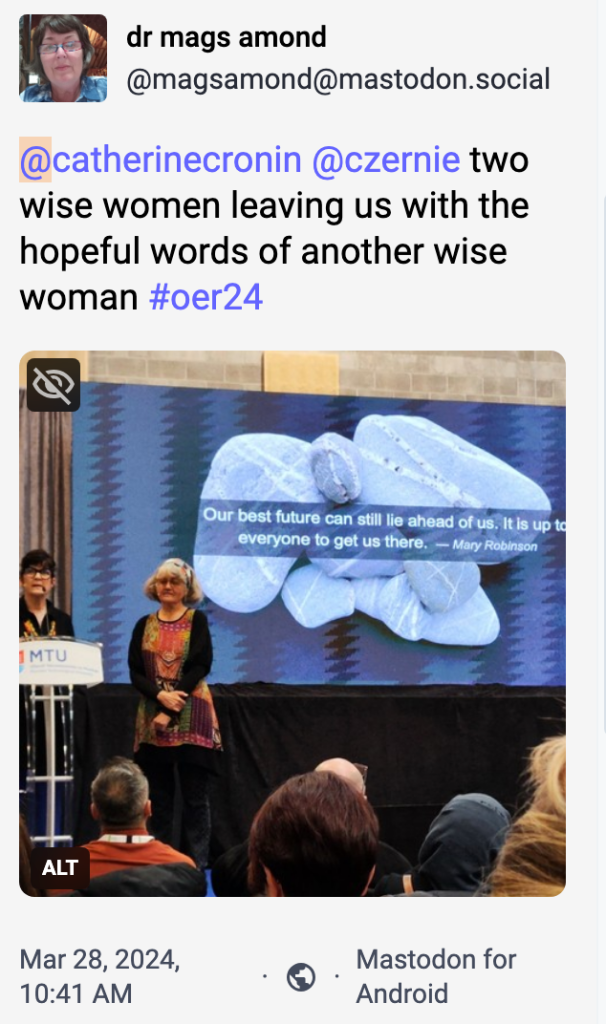
I enjoyed chairing a parallel session – chairing gives you a bird’s eye view of the interactions in the room among attendees and presenters. The more limited that time slots are (we had four presentatins to the hour), the more the presenters have to sharpen their skills, and the more ruthless (albeit with a smile) the chair’s timekeeping must be. A nice touch was the wee tomato shaped kitchen timers – can you tell Tom Farrelly advocates the Pomodoro method with students? (Forever hence to be know as Tomodoro). Thank you Merdith & Maren; Claire & Ruth; Leigh, Tom, & Fiona; Gwen & Denise for four super presentations, and the audience for a crackin’ discussion with them all afterwards. Everybody learned.
I also enjoyed presenting as part of a parallel session. I was presenting a work in progress, an analysis in response to an invitation in a compelling paper curated by Aras Bozkurt containing 54 testimonials on openness in education. My work to date was graciously recieved and I got the feedback I needed to get on, finish it, and share it. Thank you, open people of Room T105. Thank you Mary Loftus for Xtweeting the moment. (Almost misssed it as most of the social media action was out in the Fediverse).

The social side of the conference was lively – food and music and chats and craic galore – this was the chance to catch up with so many people I love to talk with and listen to. Thank you organisers for building these spaces into the schedule. I don’t remember any other conference where not one but both Chairs sang for us at the social event. Nor where several Gasta presentations featured music and song. Nor where to top is all off, we were bid farewell at the end with a verse of The Parting Glass. Co-chairs Tom Farrelly and Gearóid Ó Súilleabháin, along with their ALT & MTU teamies, really nailed the perfect mix of professionality and conviviality that makes a conference memorable. Thank you for everything.


The morning after we had a typical Irish four-seasons-in-one-day Good Friday* ; Frances and I got gloriously soaked as we shared breakfast in the rain with Catherine Cronin and Kate Molloy before heading off towards home in cars, coaches and trains.
*on the train train journey back I rested and reflected during a Good Friday experience of listening to the feed from the Unitarian Church in Dublin, as for the last time they read out the names of all those killed during the Troubles in Northern Ireland. They have done this every year since the Good Friday Agreement in 1998. The last name on the list was a brilliant young journalist, the late Lyra McKee.

Selected Teachmeet data 2013-2019 by Mags Amond is licensed under a Creative Commons Attribution-NonCommercial-ShareAlike 4.0 International License.
On Monday evening I went to a wake. An open wake, on zoom, to honour the life of Harrison Owen. As with a wake here in Ireland, there was a motley gathering of family, friends, collegues, admirers of Harrison speaking genially together and sharing stories of what Harrison had meant to them. Harrison Owen was the originator of Open Space Technology, a way of organising a conference or meeting in which the agenda is decided by participants on arrival. I had not known about OST until I began to explore TeachMeet, and I then learned about it from TeachMeet co-founder Ewan McIntosh and from my friend and colleague Richard Millwood. The more I explore, the more I realised OST is the ancestor of most unconference events. There are few hard rules, just a simple strong sequence in which a date, time and venue is set, people turn up, they set their agenda, they spend their time together, and the event concludes. It is scary, but it works … in the words of Owen, it works becasue it runs on ‘passion bounded by responsibility’. The secret to success is skillful almost invisible facilitation, and the overt declaration of The One Law – originally callled the Law of Two Feet, then the Law of Mobility, and more recently I have seen it callled the Invitation to Mobility – which ensures no one is stuck in a place they don’t want to be stuck in.

The wake had many stories and reminiscences of how people found Open Space, and as ever at a wake there was talk of the present and future of the world as well as the past. In the midst of all there as an appreciation for the many good things this man Harrison Owen had done for individuals and the world. It was an all day wake, people came and went as their time zone allowed. I happened to be there whan the total eclipse was creeping across North America, so some people were leaving their zoom window for a while to go outside, and come back and report to the rest of us as we had a screen share of the tv feed from NASA.
Thank you to the friends and family of Harrison who opened the space for people to gather and wake him. And thank you Harrison Owen for giving the world Open Space and all the good it continues to bring.
For the curious, some good reads:
Owen, H. (1987). Spirit Transformation and Development in Organization.
Owen, H. (1993). Open Space Technology – A User’s Guide.
Owen, H. (1997) Expanding Our Now: The Story of Open Space Technology.
Owen, H. (2004). Open Space as Appreciative. AI Practitioner. Ed. Holman. ISSN 1741-8224
Owen, H. (n.d.). Inviting Faster, Easier Organization https://openspaceworld.org/wp2/

Selected Teachmeet data 2013-2019 by Mags Amond is licensed under a Creative Commons Attribution-NonCommercial-ShareAlike 4.0 International License.
What is Gasta*? Its a hi-octane presentation session, 5 presenters with 5 minutes each to use as they wish, they are counted in and counted down to their finish by the audience, and that’s that. Gasta presentations are information, performative, evocative, provocative – add your own adjectives once you’ve experienced it. There’s just about breathing space in-beween presentations – the whole thing is over and done in half an hour! Reflective it is not, but it is reactive and interactive. The thing is, it has a partcular catalyst, singularity, the Gasta Master – Dr Tom Farrelly of MTU Tralee. Tom has been bringing his magic Gasta touch to conferences for years now. It is infectious – once a conference goer experiences a Gasta session, they want to experience it again.
And so it was that Gasta came to be on the program at #CESIcon 2024 in ATU Galway. Just after lunch, a perfect waker-upper plenary. Our Gastateer volunteers were Bryan Mathers, Mary Loftus, Richard Millwood, Brendan ‘Speedie’ Smith, and a trio of Turtlestitchers (me, Helen O’Kelly, John Hegarty).
Be warned – one does not simple walk into Gasta, stand and deliver one’s presentation. One is lined up by Tom, and one is counted in by the increasingly interactive audience in English or Irish 12345Gasta, and one is counted out 54321Stad exactly 5 minutes later. No Mercy. All in the best possible taste, and all evictions from the stage taken with good grace.
The thing is, despite all the mayhem, there is learning from each other – we had a reflection from Bryan on how to ensure curiosity triumphs anxiety in life … practice your curiosity; Mary led us thru her thoughts on AI and the dreaded conditional Modh Cionníollach; Richard took us through some of the computer science he favours – and reminded us how our creative expressionism in CS can enhance our lives; Speedie charmed us with a seemingly endless box of historic digital artefacts brought over from the Computer and Communications Museum of Ireland; Helen, John, and I did a lightning tour of Turtlestitch and how it is used in their classrooms. To quote someone just afterwards (their first Gasta experience) “I can’t believe how much I found out in 30 minutes”.
If you see it marked on a conference program, go along and get an infected with the joy of Gasta. Our thanks Tom for bringing the Gasta thunder to #CESIcon.
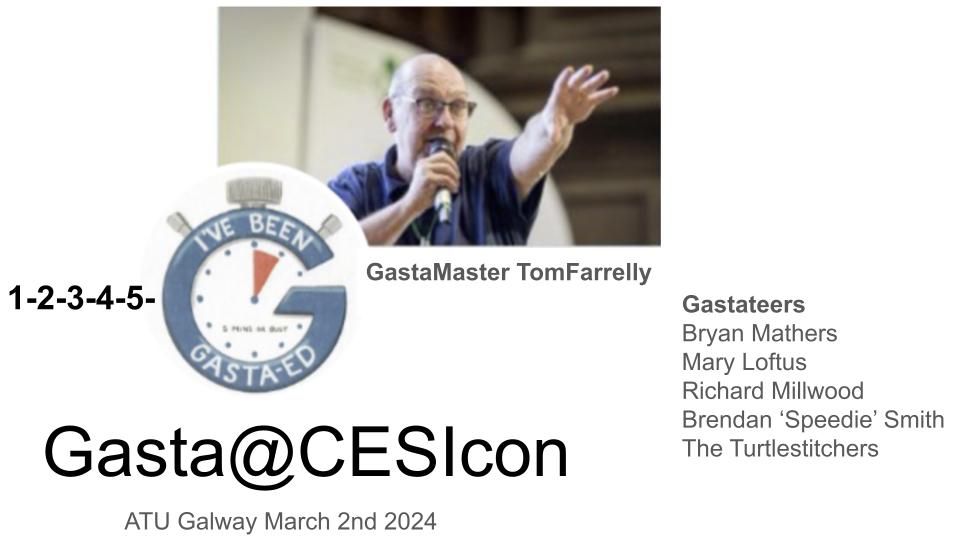






*the word translates from Irish as fast, nimble, sharp, smart, alert (https://www.teanglann.ie/en/eid/gasta); also from Scottish Gaelic as skilful, gallant, brave https://en.wiktionary.org/wiki/gasta [and if you’re reading this, Tom, it can also mean handsome, beautiful, and the best compliment for a Dub to give or get: ‘a fine thing’]

Selected Teachmeet data 2013-2019 by Mags Amond is licensed under a Creative Commons Attribution-NonCommercial-ShareAlike 4.0 International License.

BETT, the large noisy juggernaut of an ed tech show, takes place in the East End of London at the end of January each year. It is a gruelling few days for those working at the booths, and those visiting the show.
But on the Thursday evening, around about the time the official loudspeaker announcment says “The Show’s Over”, the fringe folk gather for two hours of two TeachMeets in the Excel followed by more hours of TeachEat in the Fox Connaught. These TeachMeets are convened by teachers for teachers, to share some time teaching and learning together. We had the Teaching and Learning venue within BETT, and the support of the audio-visual technical team which was a great help. And we had the magical appearance of the very welcome beverage table just as we started – who ever brokers all this help and support never gets thanked, but is very much appreciated.
The first section, with an international focus, called TeachMeet Global, is curated by Arjana Blazic and Bart Verswijvel and this year’s speakers were from all over Europe – Eduardo, Victoria, Edward, Avila, Elchin, Daniejla, Ari, and Teresita. All their presentations are here, and some pictures and speaker contact details are here.
After a break for replenishing glasses and saying hellos, the second section with a local focus is curated by Dawn Hallybone and Danny Nicholson. Dawn had to flit to a special family occasion so it was my delight to change my name temporarily to Dawn and duo up with Ian Usher as MCs for the evening. Speakers were Elena (7min), Alan (7min), Nicole (7min), Bying (2min), Mags (2min), Bernard (2min), Richard (2min), Matthew (2min), Ivan (7min), and Martin (7min). Danny had the presentations well sorted and ready for sharing here
This was an all-singing all-dancing TeachMeet if ever there was one – Eduardo started the evening playing the saxophone, Teknoteacher Alan gave us a rendition of his witty ditty (A)I Will Survive, Bying had us singing, and Elena got us in a full-on stand-up karaoke including micro-bit flashing glasses – probably the most photgraphed single item at BETT 2024.
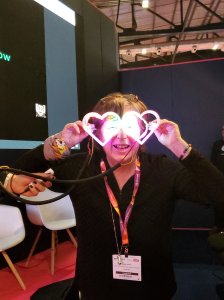
The eeriest thing about TeachMeet BETT is after it is over, because everyone else has long gone, and we all follow the security staff through an empty Excel to the exit so we can stroll over to the Fox Connaught. This is when we kick back and relax, catch up with each other’s lives, swap news and stories. It is also when we see the generosity of Nigel Canin of 2Simple, who sees to it that everyone – regardless of whether they are a 2Simple customer or not – has the full hospitality of the bar and the kitchen. Nigel’s support of #tmBETT is very much appreciated by us all.
Thank you to Dawn, Danny, Arjana, Bart, (and any others I may not be aware of) who work to organise the TeachMeets at BETT. Thanks to the teachers who put their names in the hat to share their work and ideas.
When I was travelling home after BETT I remembered something my friend John Davitt had written in the Gaurdian in 2008 after a BETT visit:
“For me, this year’s Bett came alive on the Friday evening at 6pm when the show had closed and 100 teachers came together in loose association, under the guidance of young web 2.0 wizard Ewan McIntosh – they gathered to share their experiences in five-minute chunks at the Bett TeachMeet. It was nirvana with beer vouchers!” (https://www.theguardian.com/education/2008/mar/18/link.link22“
Thanks to Ewan & co. who brought #tmBETT to life long ago;
long may it liven up the after hours at BETT.

This work is licensed under a Creative Commons Attribution-NonCommercial-ShareAlike 4.0 International License.

The Computers in Education Society of Ireland annual conference, #CESIcon, is back in ATU Galway City on March 24 2024.
The draft program, and registration form, are linked from the website conference page .
Follow #cesicon @cesitweets on the socials for updates.
For me it is a favourite weekend in the year – meet friends, make friends, learn things – and I hope as many teachers as possible can be there.

This work is licensed under a Creative Commons Attribution-NonCommercial-ShareAlike 4.0 International License.

This time last week we were just wrapping up TeachMeet CESI online, the last few stragglers tidying up the space and exchanging news and views after the event; not the same as but as close as we could get to lounging in the bar of The Anner or Skellig or Plaza hotels or any of the places we have used since our first event in the Tallaght Maldron in 2009.
This TeachMeet followed the simple path of name the date and venue, call for volunteers to speak, trust in colleagues to support and each take on the tasks they are best at (and to be fair, the @cesitweets team are an agile at a lot of tasks, especially cooperative ones) … and let it roll from there …
Checking in on the feedback, it is fair to say there was something for everyone in the mix – the perfect TeachMeet mix of ideas and resources for all levels and sectors of education. Big thanks to our volunteer speakers: Pamela O’Brien, Tony Riley, Irene Stone, Damien Quinn, Chris Reina, Danny Nicholson, Helen O’Kelly, Shane Egan, Neil Butler, Stephen Howell. Thanks to everyone who contributed in the breakout room discussions – very briefly sharing hopes, fears, concerns, questions and knowledge on AI in education – that is a conversation we will definitely continue at #CESIcon24*.
In a reversal of the usual digital random name picker we use at in-person TeachMeets, we had a very lo-tech system for choosing the next speaker in the Zoom room … pick a card, any card… (all diamonds, like our speakers!)


It was good to see the partcipants using the chat window to chatter – the BIG downside of online TeachMeet is of course that we miss the mixing and wandering we can do when in the room together, and logistics mean we have to mute ourselves most of the time. We had the whole healthy range from the newly qualified teacher to the still-active active retirées. It was a treat to “meet” so many new people alongside the familar names and heads – welcome to TeachMeet CESI, please stay around and be a presenter next time. An innovation for this TeachMeet was the live streaming on the CESI YouTube channel (now who’s glad she blurred her on-screen background?). We had between 40 and 50 people wander in and out of the Zoom café room over the evening, and over 100 viewing the stream. Hopefully this means each of us has at least one new colleague in our personal learning network, as well as at least one new resource or idea to check out.
Congratulations to the winners of our door prizes Leanne Griffin and Colin Ryan, and thanks to our prize donors Emer O’Keeffe from Name Down and Tara Jones from Clever Go, we appreciate both offers of support. Nice job on the roulette wheel, Kate Molloy – we usually have the speaker names there, it was cool to see all the attendees wheeling round together …
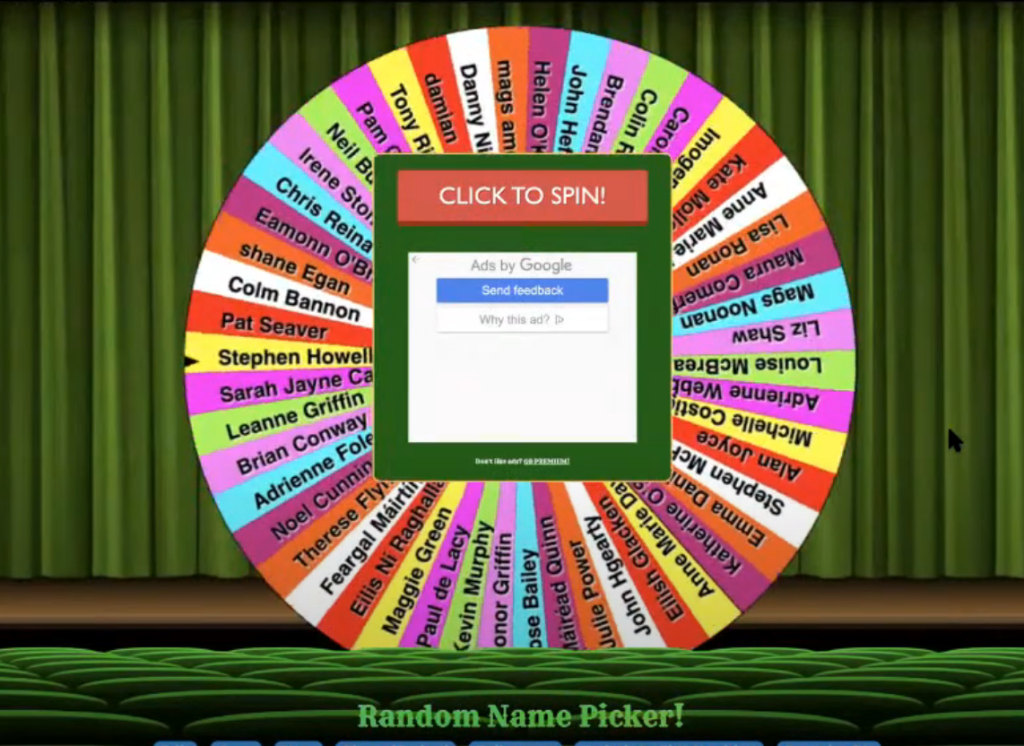
*Our Co-chairs Pat Seaver and Kate Molloy ended the evening with news of our annual conference #CESIcon24 – the date and venue being Saturday March 2nd 2024 in the Galway City campus of ATU. The call for proposals and expressions of interest was also released, so get your ideas in by December 1st.

This work is licensed under a Creative Commons Attribution-NonCommercial-ShareAlike 4.0 International License.

This day just one month ago was the 2023 Standing Conference on Teacher Education North & South in Lough Erne Estate. The greeting on arrival – mist on the lake and migrating swans – set the mood for a communal reflection on teacher education across the island. Our parting glass of dessert was no mere trifle after two days of intense discussion and sharing. The full menu – the conference programme – can be accessed here: https://scotens.org/site/wp-content/uploads/Programme-SCoTENS-Conference-2023-web-1.pdf
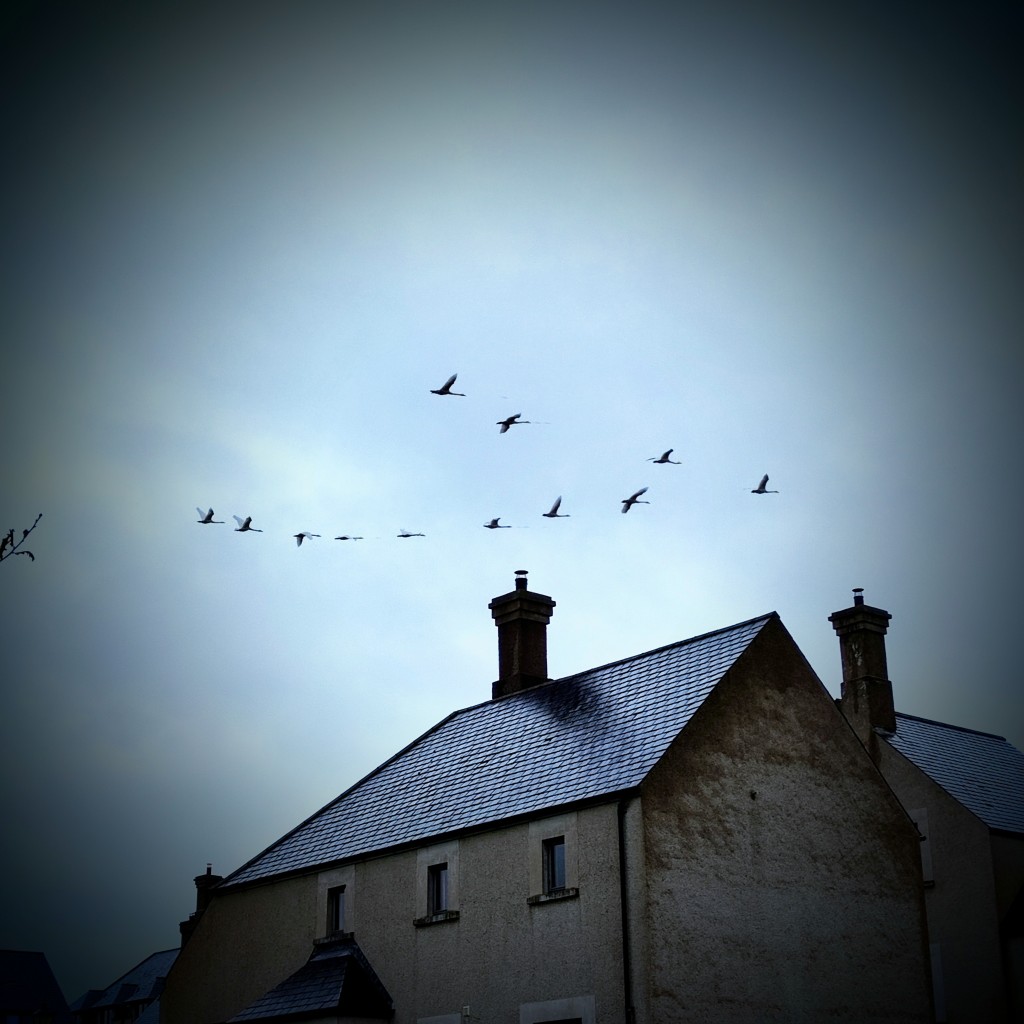
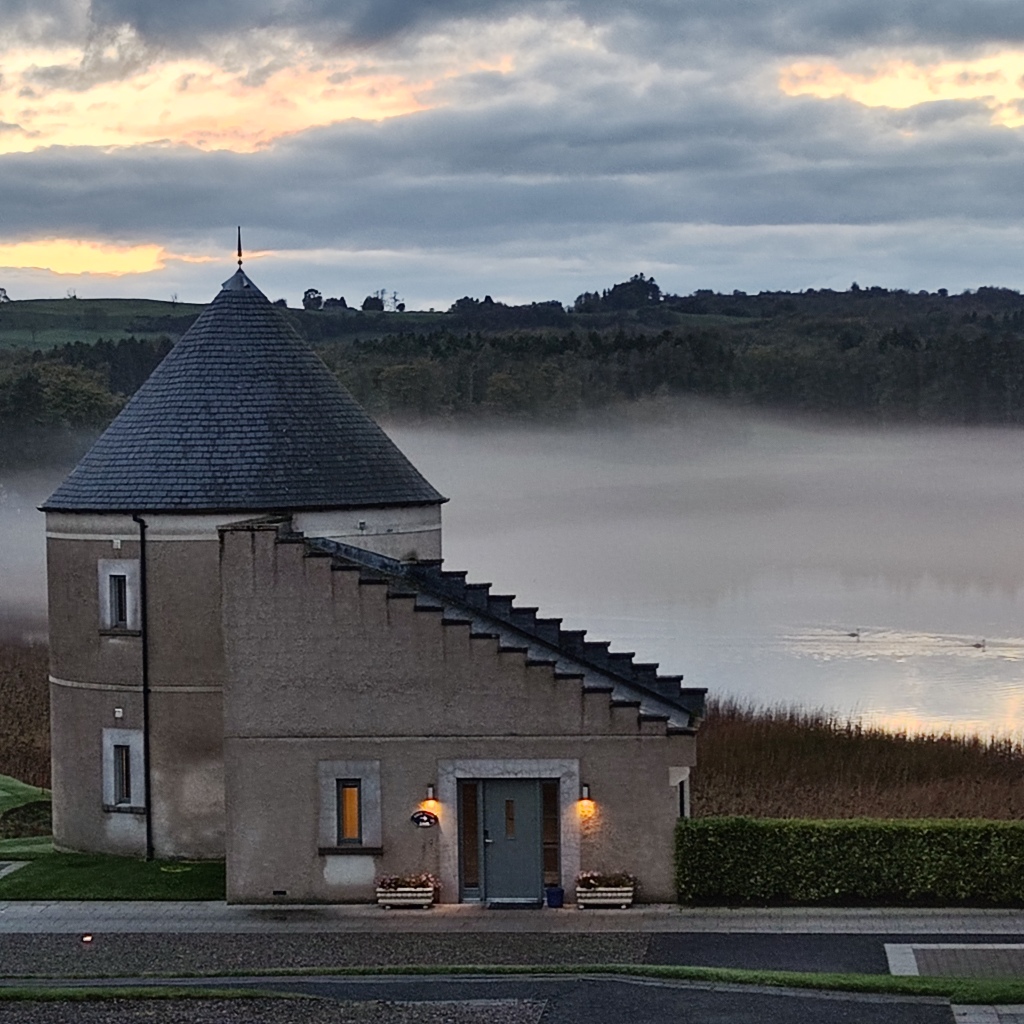
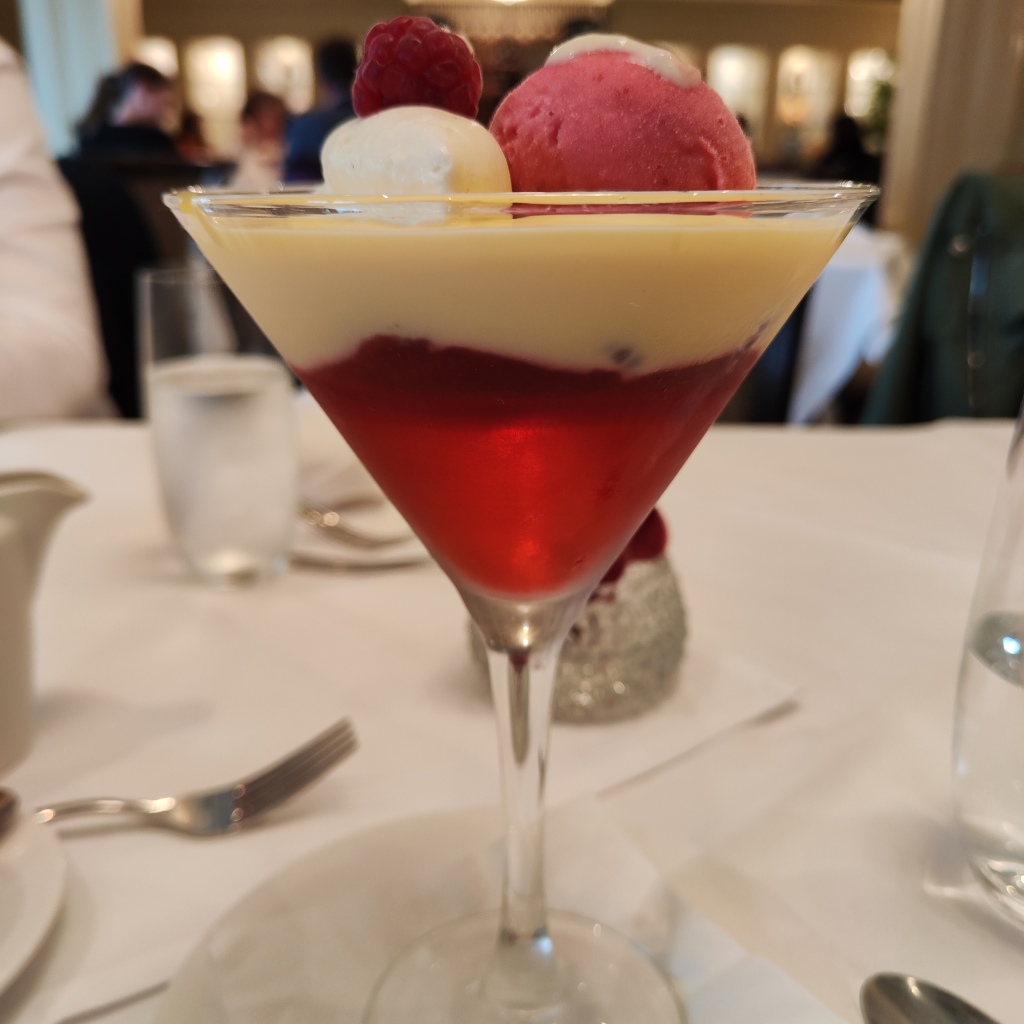
Reversing the reel of the two days … the theme of hopes dreams possibilities was diffused right thru it… the programme had thoughful keynotes, a provocative panel discussion, and an refreshing round table structure (hat tip Des Carswell) at which we each presented our papers and listened as others presented theirs (twice each). This made for very interactive discursive and interactive presentations, and meant that as a presenter one did not miss out on hearing some of each others’ papers. The only downside was we did not have a general feedback space; hearing the chatter and seeing the intense attentiveness across the room induced strong FOMO!! and it would have been good to get a feel for what was happening in other spaces. I didn’t get a picture of Table 6’s second outing, but our names are here on the Kindness booklet Eamon Costello gave me. I think the picture below of the first outing at Table 6 (standing are Pamela O’Brien, Joanna Madalínska-Micalak, Me, Siobhan Canavan; sitting are Beverly McCormick, Mairéad Holden) conveys the mood as we concluded the session.
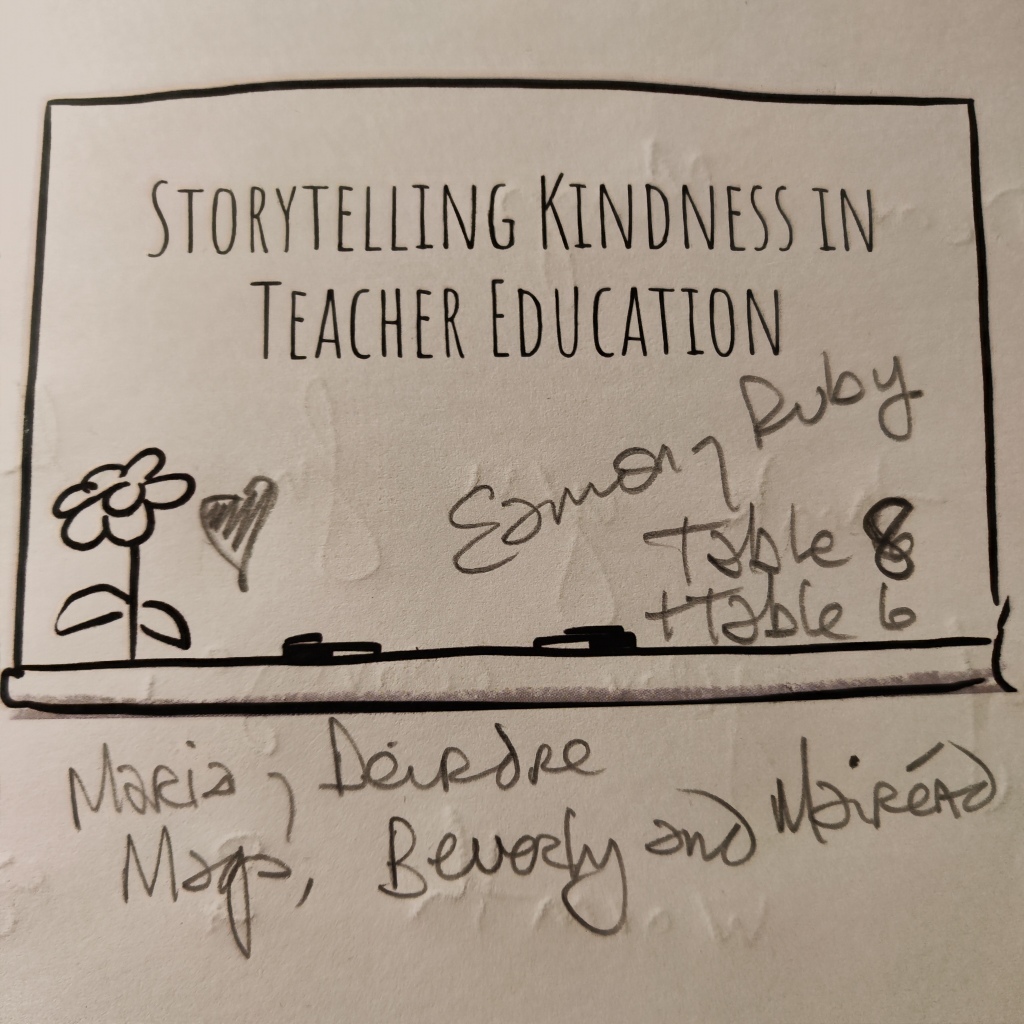
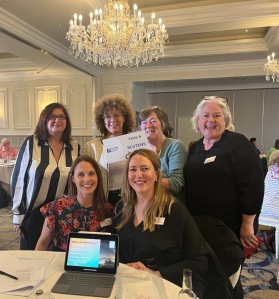
One delightful moment for me, on the first evening, was a compelling after dinner address from Andy Pollak, whose voice was so familar to me from his RTE radio reports long ago.
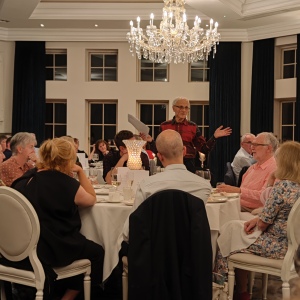
The last paragraph here goes to the first session, or pre-session of the conference, the Doctoral Round Tables. This was my main reason for attending the conference. As outlined in the previous post, the ScoTENS Doctoral Round Table has been very important to my PhD journey; I was returning to say thank you, and to encourage the current class of doctoral sojourners. As ever, Conor Galvin ran a gentle but firm course through the time and space we had allocated, giving each student the floor in turn*, appointing individuals to take notes and give personal feedback later during the conference, and facilaiting a short open discussion after each presentation. It turns out that listening and responding critically to other students’ explaining their progress (or otherwise!) is as important as is presenting your own dissertating dilemmas. Who Knew? 😉
Thanks to the lovely people who attend SCoTENS, the conversations over the two days were fabulous, the perfect mix of serious professional discussion and some non-serious conviviality in the casual spaces.
Thanks as ever to the planners, organisers, and hosts who have made the SCoTENS annual gathering one of the highest points of learning in my academic year since 2016.
*Pictured below is Natasha Kiely giving us her ‘Wedding Table’ metaphor for PhD planning – very apt for the lavish tableclothed chandeliered surroundings in which we were meeting. The other people in the picture are a mixture of PhD students, mentors, and recently graduates of this informal but formative SCoTENS ‘School for Doctoral Students’.
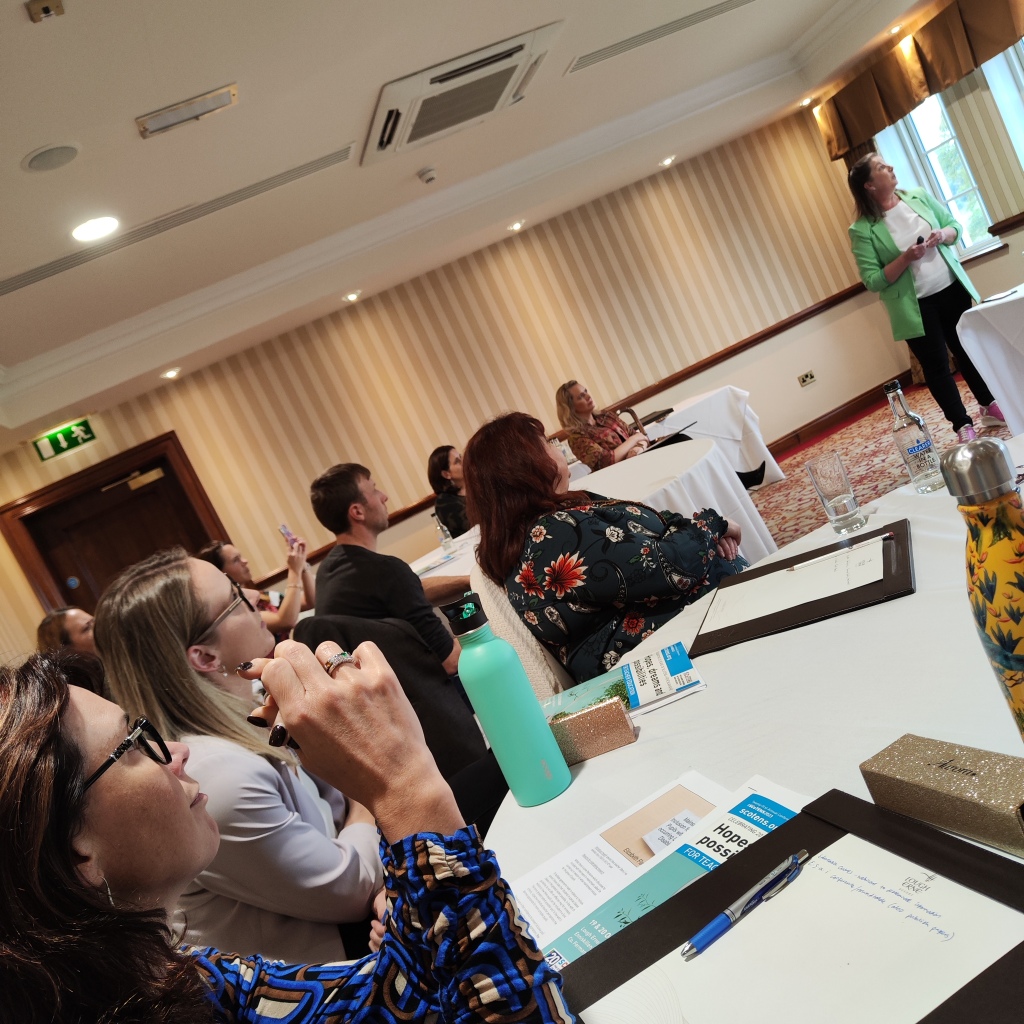

This work is licensed under a Creative Commons Attribution-NonCommercial-ShareAlike 4.0 International License.
From the SCoTENS website – it is the “Standing Conference on Teacher Education, North and South, a network of 34 colleges of education, university education departments, teaching councils, curriculum councils, education trade unions and education centres on the island of Ireland with a responsibility for and interest in teacher education … established in 2003 to create a safe space for teacher educators – North and South– to come together and discuss issues of common interest, and explore ways of co-operating closely together“
The first SCoTENS doctoral round table within the conference was in 2016 – a rapid round robin convened and chaired by Conor Galvin, and us all piled around a big white wedding table in the corner of a ballroom. And who comes to observe quietly in the front table? Etienne Wenger. Yes, that Wenger, who was keynote and workshopper at the conference that year. Way to inaugurate a dynamic roving doctoral community of practice, eh!? [The workshop was remarkable, a story for another day]
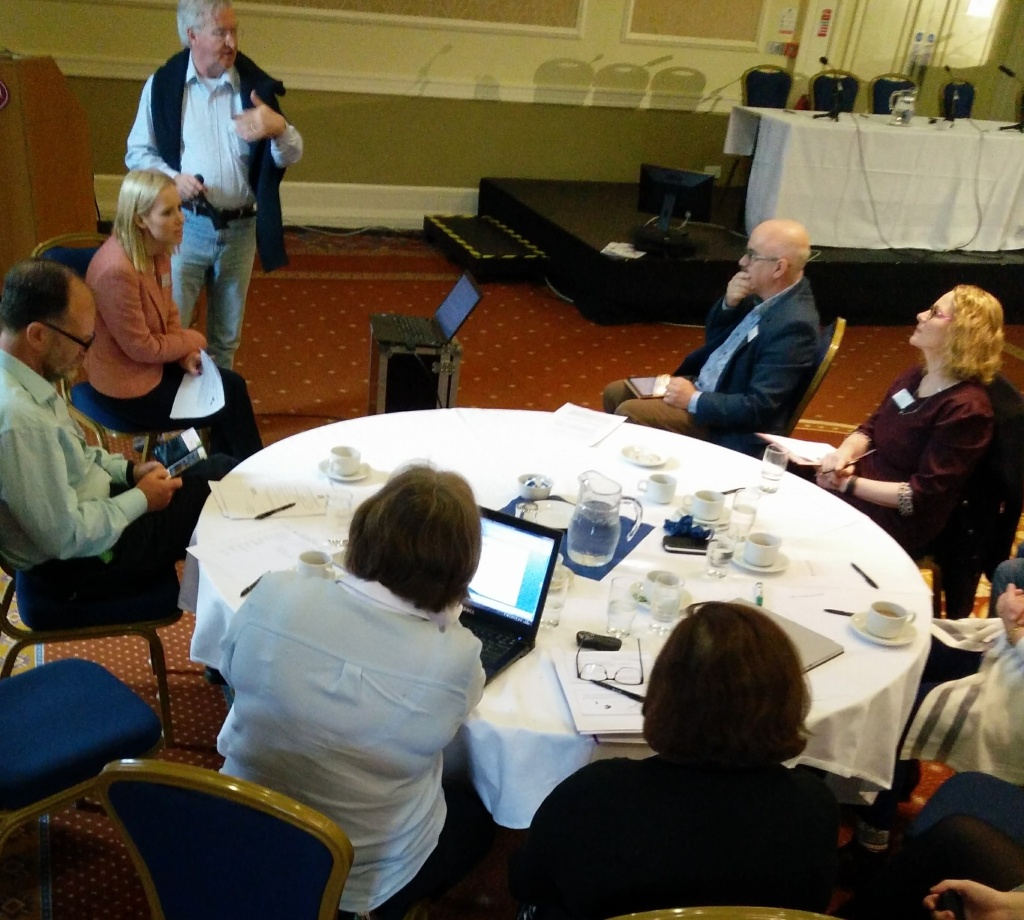

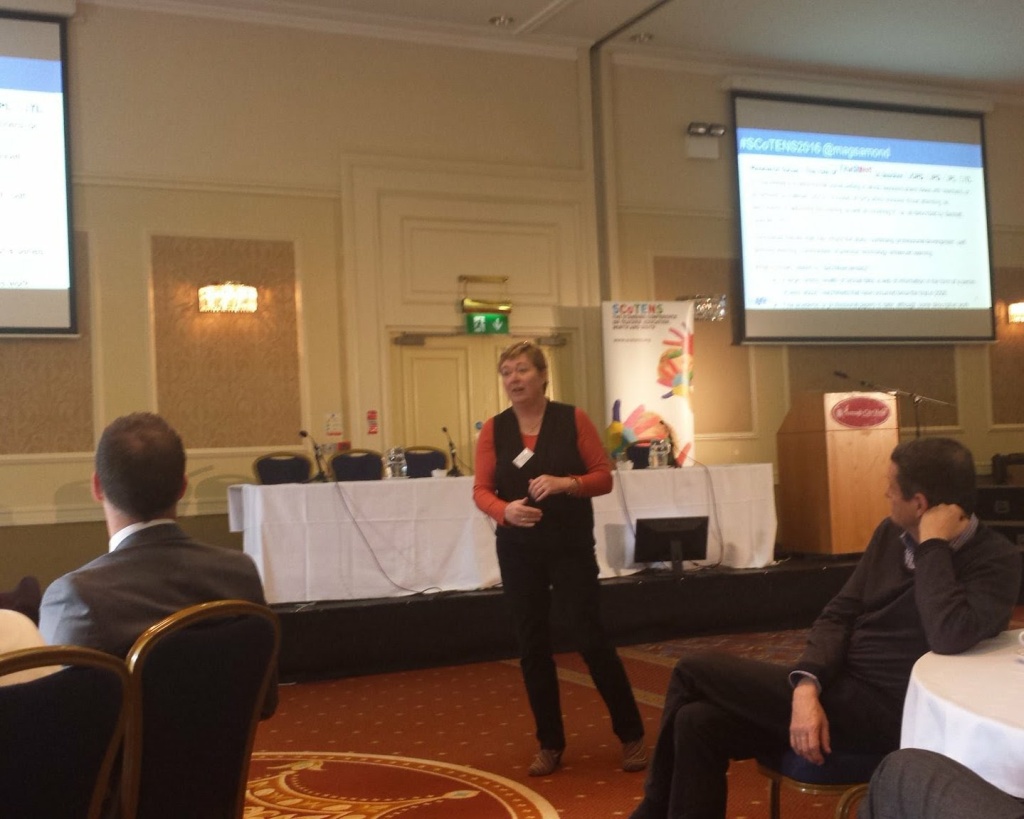
What I remember is that around the table there were doctoral students at every stage of their study – I had only gotten my student card the week before, someone else was awaiting their viva. So each short input / nanopresentation I heard – methodology, methods, instruments, findings, propositions … filled me with wonder. And it has been the same each year since, except that each time I came I had to jumped another stone in the stream, and went away with advice on how to approach the next stage.
[One point of interest – that first year in Armagh there were no powerpoint presentations, literally stand up and speak up, and there were about a dozen of us, and we went in random order. Short papers had been submitted in advance – I have a sketchy memory of us reading a couple of each other’s the night before, but the strongest memory is of us each getting invested in the other’s research story as we listened to them outline it]. That heady mix of doctoral students at every stage of their study, from proposal to publication, that surrounded me (the one who was literally taking her first steps) has been the same each year since, except that each year I arrived having jumped to another stone in the stream, and departed with advice – from mentors and peers – on how to approach the next leap.
The theme of the 2023 conference was announced with an invitation for proposal based around three questions …
What should we celebrate from SCoTENS Past?
What should SCoTENS Future aspire to?
What in SCoTENS present gives you hope?
Drawing on a theme from my PhD, the power of intentional personal professional practice, and looking back to draw on that theme from Armagh 2016 – Communities of practice: Learning together to teach together, my response was a proposal for a round table discussion on the annual SCoTENS in-house doctoral round table itself. Yesterday I dumped it all into a ‘placemat’ for the round tables tomorrow and Friday in preparation for gathering some thoughts on past-present-future of what has been of the most formative experiences I experienced along my PhD path.
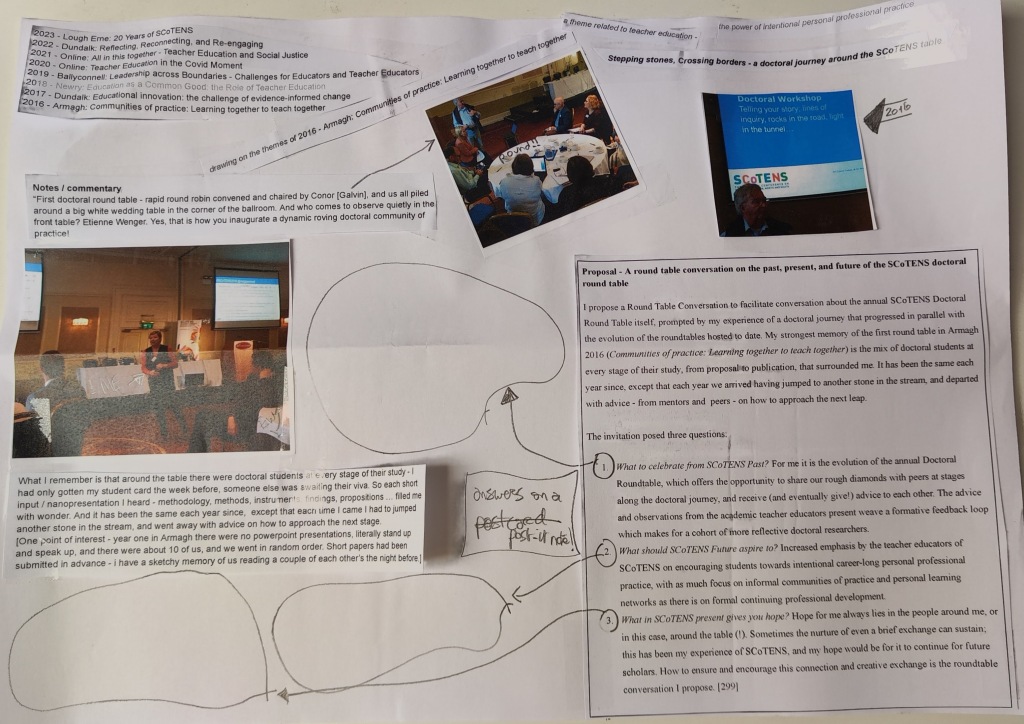
ps – I’m delighted to be sharing my round table with fellow SCoTENS PhD sojourner Mairead Holden, and Beverley McCormick, whose theme is also one celebrating the annual SCoTENS conference – how it has literally put us student researchers over the years standing on the shoulders of giants.
This post by mags amond is licensed under a Creative Commons Attribution 4.0 International License.